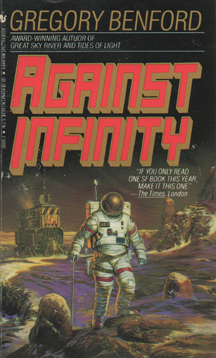‘ON THE POISONOUS, ICY SURFACE OF GANYMEDE, A MAN AND A BOY ARE ON A DEADLY HUNT
Their prey is the Aleph – an unknowable alien artifact that has roamed and ruled Ganymede for countless millennia, Indescribable, infinitely dangerous, the Aleph haunts men’s dreams and destroys all efforts to terraform Ganymede into a habitable planet.
Now in a modern world an ancient struggle begins, as a boy seeks manhood, a man seeks enlightenment and a society seeks the power to rule the universe.
In GREGORY Benford’s first novel since Timescape, men discover that the Aleph is their prey, their victim – and their destiny.’
Blurb from the 1984 Pocket Books paperback edition
Manuel is a young Ganymede native, born on the Jovian moon during the early part of a terraforming operation. Manuel’s work is to help his father, Colonel Lopez, and his team with various duties, the bulk of which involves tracking down and hunting ‘warped’ organisms; mutated descendants of creatures the scientists designed to scrub the planet and its atmosphere of methane and ammonia.
It would appear, however, that the colonists and human-designed wildlife are not alone on Ganymede.
Alien artefacts have already been discovered in other parts of the outer Solar System but on Ganymede there is a functioning artefact nicknamed Aleph; a mobile, shape-shifting rock-burrowing entity. Aleph is mining Ganymede for its own esoteric reasons and has resisted all attempts to destroy and capture it.
Now Manuel, his colleague Old Matt and a psychotic cyborg called Eagle have encountered Aleph again and are planning to capture and destroy a creature which may have been tunnelling through Ganymede before Man even evolved.
In comparison to Benford’s ‘Artefact’, written around the same time, this emerges as a far superior work, albeit shorter.
There’s a very pacey feel to it which is helped by that fact that the action jumps ahead in leaps and bounds and we see not only Manuel’s maturation from boy to man but the gradual transformation of the face of Ganymede from an icy moon to a functioning biosphere.
It would have been interesting for Benford to have expanded a little more on the terraforming/biodesign element which is fascinating in itself. I am left wanting to know more about Earth and the society that is evolving in the asteroids at this point but, as I have always praised writers who left some questions unanswered, I shouldn’t really press this issue too far.
From what we gather from the final section, Earth has moved on politically to become a Marxist world, a political system which only survives by expansion and which, necessarily, so Benford informs us, needs a Capitalist system at the fringes. This is an intriguing concept and one on which I wish Benford had expanded more fully throughout the book.
Ultimately, one is left a little unsatisfied, which is unfair to Benford since this is an interesting and thought-provoking work, well thought-out and featuring mostly Latino protagonists.
Sequel to ‘The Jupiter Project’

